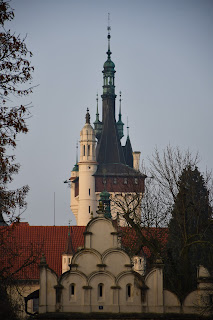Northwest of Prague
My dad had an errand to run near Roudnice nad Labem, a town about fifty kilometres north of Prague. Since he knows the area well, he took me and my sister to visit some sights along the way.
Our first
stop was the town Slaný, which has always been “flyover country” (or ride-past
country?) to me, but I have since learned it is a quite picturesque
destination. The town’s centrepiece is an elegant, baroque-neo renaissance town
hall, but it also boasts a late nineteenth-century synagogue (recently
converted into a police station), and a large gothic church dedicated to Saint
Gotthard. The entire town can be seen from Slaný Mountain, which can be found
to its east.
By Czech
standards, Slaný is a very old town: The Church of Saint Gotthard dates to the
twelfth century and one chronicle of dubious credentials alleges it was founded
as early as 750. In the fifteenth century Slaný was a prominent Hussite centre and retained its rebellious character
for centuries, joining the 1618 Bohemian Revolt against the Habsburgs. The
family of Frederick V, the Winter King, sojourned in the town during the war.
We made
another brief stop at Mšené-lázně,
a spa town between Zlonice and Roudnice nad Labem. Its spa was founded
in 1796 and is in operation to this day, albeit to a lesser degree during the
pandemic.
We arrived in Roudnice nad Labem in the afternoon and spent
half an hour walking around the centre. The most striking sight in Roudnice is
its chateau, which dates to the twelfth century but owes its current visage to
renovations made in the sixteen hundreds. Roudnice was the seat of Archbishop Konrád of Vechta during
the Hussite Wars and was pillaged by Hussite armies on multiple occasions. The
city’s Catholic inclinations are reflected by the tellingly named Church of the
Nativity of the Virgin Mary. It is also home to multiple picturesque towers and
an art-nouveau peasants’ credit union.
We then
made an impulsive detour to the town Úštěk, which is known for its quaint late-gothic burgher houses and small nineteenth century
“bird houses” built into the rock on which the old town stands. A few
kilometres north of the town is a baroque calvary hill, which offers views of
Úštěk and the neighbouring Chmelař lake.
It was late
in the afternoon when we arrived in Litoměřice, an old and historically
significant town despite its current population of twenty-three thousand. We
passed by Ploskovice Chateau on our way there, but we ascertained from afar
that it was under reconstruction, so we decided not to visit (Ploskovice is famous
for its association with the folk hero Dalibor of Kozojedy, who was actually a
bit of a scoundrel in real life).
Litoměřice
was founded in the tenth century on the site of an earlier fort, but the area
has been inhabited for thousands of years. It is home to the Cathedral of Saint
Stephen, the Church of All Saints, the Church of Saint Jacob, and a Jesuit
college, as well as a number of noteworthy municipal buildings. The town hall
is a prominent example of Saxon Renaissance architecture in the Czech Republic,
and the houses around the main square are said to be among the oldest
continuously inhabited residential buildings in the country.
On our way
back south we visited two more castles/chateaux. The first was Budyně nad Ohří,
which was damaged a number of times throughout its thousand-year long existence
by a variety of calamities, including the Seven Years’ War, the Thirty Years’ War, and a gunpowder
explosion. The second was Libochovice Chateau, which was devastated by three
different fires over the course of four hundred years.
Our last
stop was Kladno, a post-industrial city that is not commonly associated with
tourism. However, the city centre boasts several remarkable sights, including a
large Marian column from 1741, the Romanesque revival Church of the Assumption
of the Virgin Mary, and the neo-renaissance town hall. Also, there are bears in
the enclosure under the city’s chateau.
A spa building
Part of the main building at Mšené-lázně
The main building again
The entrance to the main building
Artwork (perhaps a Firebird?) in front of the main building
More art
More artA wooden pole
Another picture of the main building
Statues at Mšené-lázně
The statue of a king
The ruins of a church at Mšené-lázně
The same ruins and a viaduct on the right
The viaduct again
Another spa building at Mšené-lázně
The chateau again
Orange tulips
A town tower
The same from up close
Another tower
Church of the Nativity of the Virgin Mary
Peasants' Credit Union
The same behind a statue of Jan Hus
The same again
Synagogue in Úštěk
A wooden house in Úštěk
A prominent burgher house
The same again
More burgher houses
The same again
More of the same
The Church of Saints Peter and Paul
Another burgher house
The town square
Some sort of brewery, perhaps
Picard Tower
Another view of the Church of Saints Peter and Paul
More houses in the centre of town
Statues at Calvary Hill
Calvary Hill
More of the same
Ibid.
Ibid.
Ibid.
A local hotel with beautiful sgraffiti
Litoměřice town hall and the All Saints' Church
The same again
The Cathedral of Saint Stephen
All Saints' Church again
The Church of Saint Jacob
The Church of Saint Jacob again
Kalich house
Litoměřice Town Square
A local building
Graffiti
Budyně nad Ohří Castle
Libochovice Chateau
More of Libochovice
The same
Kladno ChateauIbid.
Ibid.
Kladno town hall
Plague column
Mayor Pavel Square
A local bank













































































































Comments
Post a Comment